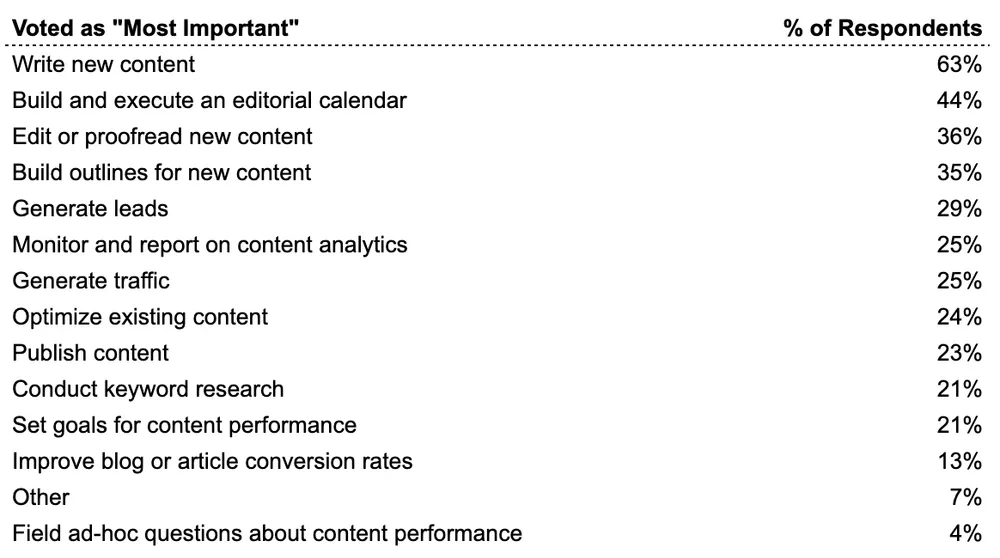Content marketing continues to evolve and expand at a blistering pace. It seems like the duties of a content marketer keep expanding with it.
We wanted to better understand how content marketers spend their work hours. To find out what feels important to them, what feels difficult, and what feels irrelevant.
So, in June 2022, we created a survey to find out.
We invited anyone who considered themselves a content marketer. Participants included writers, content marketing managers, content directors, and a few other roles.
We received 75 responses. About half (35) of the respondents were in-house marketers, a third (22) were freelancers, and the rest were employed by an agency.
The survey
We asked participants 3 questions:
- Which are the most important jobs you do in your professional role?
- Which are the least important jobs you do in your professional role?
- Which are the most annoying or difficult jobs you do in your professional role?
For each question, we encouraged respondents to choose 4 answers from a list. (Let’s call these “votes”.) It offered the following choices:
- Build and execute an editorial calendar
- Build outlines for new content
- Conduct keyword research
- Edit or proofread new content
- Field ad-hoc questions about content performance
- Generate leads
- Generate traffic
- Improve blog or article conversion rates
- Monitor and report on content analytics
- Optimize existing content
- Publish content
- Set goals for content performance
- Write new content
- Other
Summary of content marketing jobs to be done
Most content marketers are focused on being content writers rather than content strategists. (In-house, freelance, and agency marketers were generally in agreement on this opinion.)

Furthermore, the strategic and analytic tasks were considered not only unimportant, but also annoying. These results surprised us – partly because we know those tasks to be high-impact levers.
The least important content marketing jobs
Unsurprisingly, the least important jobs to be done are generally the inverse of the most important jobs to be done. But the list makes it more clear which particular jobs are explicitly considered less important.
Overall, content analytics seemed to be considered relatively unimportant. This was a surprising finding, since how content performs would seem to be a critical part of understanding how a strategy is working (or isn’t working).
By far the most consistent response for a less important marketing job was “fielding ad-hoc questions about content performance.”
Anecdotally, we know this to be a very common task for marketers. And it’s one that can become a major distraction for marketers – especially when they’re fielding these questions from a CEO. And it doesn’t always lead to improvements in underlying strategy or the performance of a particular piece.
The most annoying content marketing jobs
The tasks deemed most annoying or difficult were primarily strategic tasks.
Specifically, the tasks deemed most annoying or difficult were: content analytics, performance questions, setting goals, keyword research.
The most annoying or difficult tasks show a lot of overlap with the tasks that are viewed as least important (but this overlap isn’t total).
When we overlap this data with the data from other questions in the survey, we start to get a fuller sense for how our respondents feel about certain tasks. For example…
- “Setting goals for content performance” is a task considered both annoying and important
- “Monitoring and reporting on content analytics” is considered both annoying and not important
- And the task that’s considered most annoying and unimportant is “fielding ad-hoc questions about content performance”.
Next steps
As noted, we were surprised to find the strategic and analytic tasks undervalued by respondents to the survey. These tasks have high leverage within an existing content library, and content marketers could distinguish themselves by participating more in these tasks.
Based on the findings of this survey, we’re wondering:
- Are strategic and analytic tasks simply the purview of senior staff?
- How can we convey that value of analytics and strategy to content marketers?
- What factors discourage marketers from owning analytics and strategy?
- What can we do to make these tasks more accessible to content marketers?
- Is ‘content marketer’ simply synonymous with ‘content writer’? Or is there a more expansive way to define the position?
